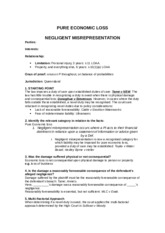Are There Concurrent Liabilities In Contract And Tort Under A Building Contract? The Court Of
 From April to September 2016 the group is also joined by InternKats Eleanor Wilson and Nick Smallwood. The case need to also in certain instances reduce the need, in conjunction with the other developments pointed out above, for extra legal costs to be spent in formulating complex claims in tort alongside more easy contractual claims. On the other hand, a contractual limitation could not apply exactly where the tort is independent of the contract in the sense of falling outside the scope of the contract (BG Checo, para 21).
From April to September 2016 the group is also joined by InternKats Eleanor Wilson and Nick Smallwood. The case need to also in certain instances reduce the need, in conjunction with the other developments pointed out above, for extra legal costs to be spent in formulating complex claims in tort alongside more easy contractual claims. On the other hand, a contractual limitation could not apply exactly where the tort is independent of the contract in the sense of falling outside the scope of the contract (BG Checo, para 21).
Reflecting upon the wording of a duty to take reasonable care”, it would look unlikely, but offered the respective tests for remoteness it seems that the causes of action in contract and tort concurrent but distinct. The initially connection is a single in which the contract stipulates a a lot more stringent obligation than the general law of tort would impose. … Read the rest >>>

 I see no explanation in principle why the exact same strategy ought to not be taken in the present case. The question was whether a contractor, having entered into a contract with its employer, could owe a duty of care in tort not to trigger economic loss and as a result be liable to the employer for a longer limitation period At the time of Murphy v Brentwood, most individuals would almost certainly have answered no” to the question and (save for personal injury or damage to other home) it seemed the law of tort was dead as regards building contracts.
I see no explanation in principle why the exact same strategy ought to not be taken in the present case. The question was whether a contractor, having entered into a contract with its employer, could owe a duty of care in tort not to trigger economic loss and as a result be liable to the employer for a longer limitation period At the time of Murphy v Brentwood, most individuals would almost certainly have answered no” to the question and (save for personal injury or damage to other home) it seemed the law of tort was dead as regards building contracts. Liability in tort might arise separately but will sit alongside a contractual suitable (hence concurrent). In Henderson v. Merrett , Lord Goff laid down the present English position on concurrent liability, by holding that the existence of a contract involving parties does not necessarily exclude the concurrent existence of liability in tort. Here, the plaintiff could seek to sue concurrently or alternatively in tort to safe some advantage certain to the law of tort (such as a much more generous limitation period) (BG Checo, para 19).
Liability in tort might arise separately but will sit alongside a contractual suitable (hence concurrent). In Henderson v. Merrett , Lord Goff laid down the present English position on concurrent liability, by holding that the existence of a contract involving parties does not necessarily exclude the concurrent existence of liability in tort. Here, the plaintiff could seek to sue concurrently or alternatively in tort to safe some advantage certain to the law of tort (such as a much more generous limitation period) (BG Checo, para 19). One particular frequently hears the term ‘joint tortfeasors’ in relation to claims involving a number of defendants. The question was no matter whether a contractor, having entered into a contract with its employer, could owe a duty of care in tort not to bring about financial loss and hence be liable to the employer for a longer limitation period At the time of Murphy v Brentwood, most individuals would most likely have answered no” to the question and (save for individual injury or harm to other property) it seemed the law of tort was dead as regards developing contracts.
One particular frequently hears the term ‘joint tortfeasors’ in relation to claims involving a number of defendants. The question was no matter whether a contractor, having entered into a contract with its employer, could owe a duty of care in tort not to bring about financial loss and hence be liable to the employer for a longer limitation period At the time of Murphy v Brentwood, most individuals would most likely have answered no” to the question and (save for individual injury or harm to other property) it seemed the law of tort was dead as regards developing contracts.





